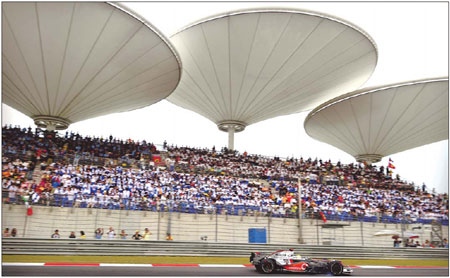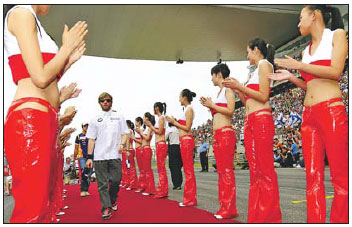Top News
A winning formula
(China Daily)
Updated: 2011-02-27 10:26
 |
Large Medium Small |
|
 Lewis Hamilton of McLaren-Mercedes heads to victory in the Formula One Grand Prix at the Shanghai International circuit on Oct 19, 2008. Shanghai has extended its deal to host the Chinese Grand Prix for seven more years despite falling attendance. The city will continue hosting the race until 2017 and organizers say they will lower ticket prices, among other measures, to attract more spectators. [Photo/Agence France-Presse]
|
Despite declining spectator numbers and high costs, Shanghai has made a long-term commitment to host the F1 Grand Prix, Gao Changxin reports
Though the Formula One Chinese Grand Prix has generally run at a loss, the Shanghai government has committed itself to hosting the event for seven more years.
"F1 gives a boost to many of the city's industries, including hotels, restaurants and car sales. It also raises Shanghai's international image by exposing the city through global media and gives Chinese enterprises an advertising platform to make themselves known on the international stage," said Yang Yibin, marketing manager with Juss Events, one of the race's organizers.
"Taken all together, F1's overall benefit to the city is more than enough to offset the losses in operations," Yang said.
The Shanghai government this month announced it had extended its deal to host the Chinese Grand Prix until 2017. The race was first held in Shanghai in 2004.
The popularity of the race has declined in recent years. Attendance at the race peaked in 2005, attracting 270,000 spectators, but dropped to 155,000 last year, which was a recovery from a low of 120,000 in 2009, according to figures released by Juss Events.
But Chen Yiping, deputy head of the Shanghai Municipal Sports Bureau, said during the organizing committee's press conference on Feb 16 that the race had brought Shanghai more than 10 billion yuan ($1.52 billion) in direct and indirect economic benefits over the past seven years.
He said the investment and maintenance of the racetrack in Jiading had helped promote the district's development as Shanghai's automobile and automobile parts base.
Meanwhile, the event also promoted the development of China's motor sports, Chen said, adding that more than 100 motor sports events had been held in the city from 2004 to 2010.
"In fact, nearly all cities around the world lose money hosting F1, but they all want to keep doing it because F1 goes far beyond just a sports event," said Yang.
However, Shanghai has not given up on turning the balance sheet of the event into the black, taking various measures this year, including lowering ticket prices and revamping parking facilities, to attract more fans to the race.
Prices of the premier tickets have been lowered this year to 3,280 yuan and 2,180 yuan from 3,980 yuan and 3,580 yuan in 2010. Meanwhile, private cars will be allowed, for the first time, to be parked next to the racetrack, said Yang.
"We will also have more activities at the racetrack to enrich the spectators' experiences," Yang said. "Most Chinese spectators know little about the race and come just out of curiosity. Giving them more alternatives can keep them from feeling bored and increase the chance of coming back again."
Casey Uuerph, an American sales manager who has lived in Shanghai for four years, said he is glad the city has chosen to keep the race.
"I have been to the race three times in four years. I think Shanghai has done a great job hosting the event. It is good news that it has lowered prices and improved facilities. I will keep going," said Uuerph.
|
 Nick Heidfeld of BMW Sauber leads the drivers parade before the start of the F1 Grand Prix at the Shanghai International circuit on Oct 19, 2008. [Photo/Agence France-Presse]
|
| 分享按钮 |